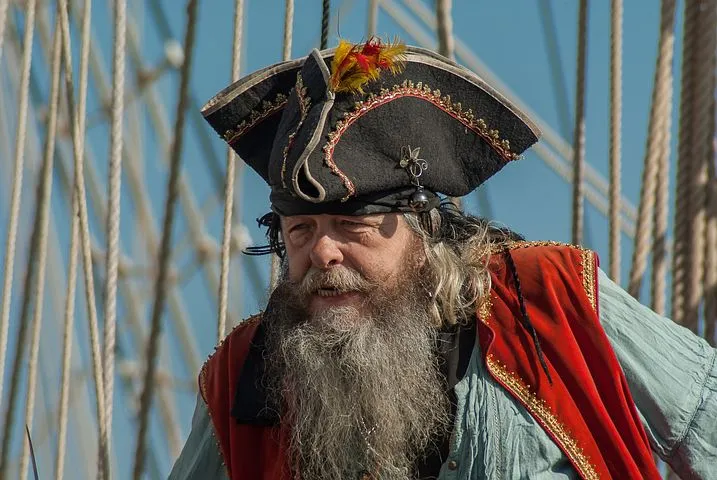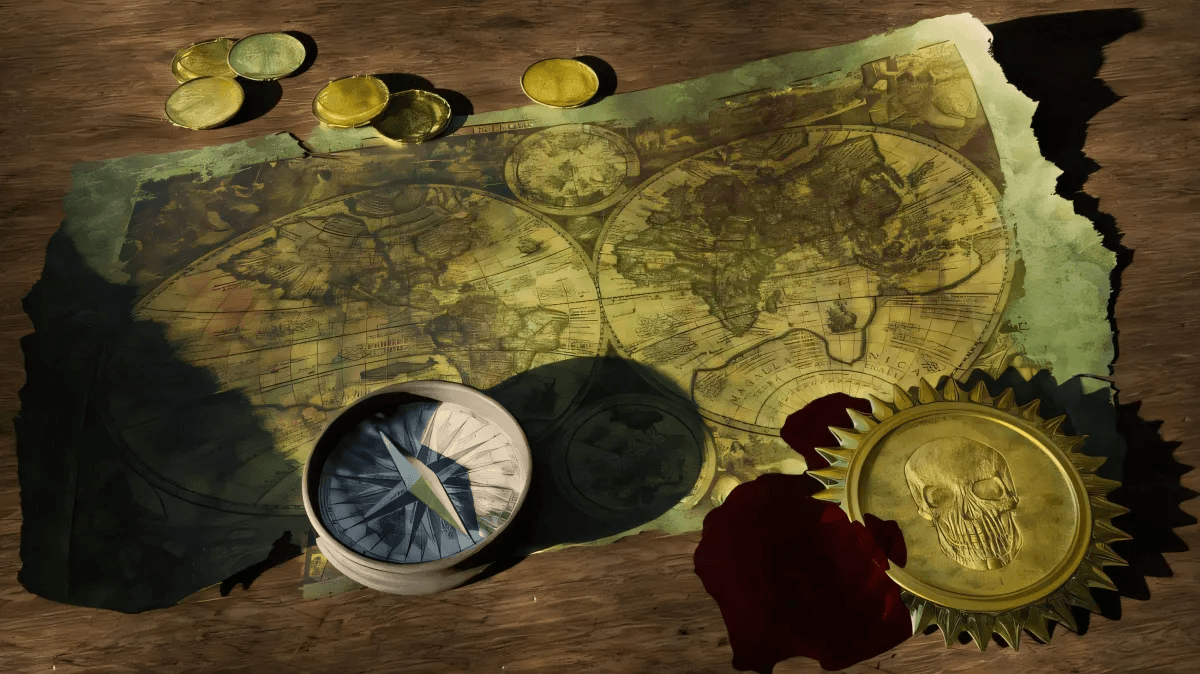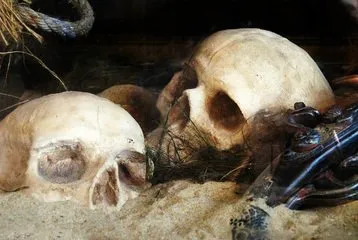Are You Addicted To Pirates? Here's Why

Introduction
Pirates and general piracy are popular topics of many fantasy or medieval faires. But that's not where the limit lies.
For many people, it's also a favoured costume choice for Halloween and other themed parties. Don't deny it, you know who you are.
When you hear of pirates, Jack Sparrow or Captain Hook probably come to mind. Or if you're a real hardcore fan, you'll most likely have associations of the most famous ones: Blackbeard, Anne Bonny, Mary Read, or Calico Jack. The list is non-exhaustive.
But for education's sake, I'd like to point out this isn't where the variety ends. If you've got a minute or two, make sure to read up on Barbary pirates or the Wokou.
They were Muslim and Southeast Asian pirates respectively. No, seriously, read up on them. You won't be disappointed. You'll probably be disturbed, but definitely not disappointed. Anyway.
If you've clicked on this article then it's because of either one of these options. Number one: you're addicted to pirates and want to find out what's wrong with you. Number two: you know of someone with the above affliction and you want to find out how to help them.
To the first category of people, I say welcome aboard! To the other one: there's nothing wrong with us and we don't need your pity. Get a hobby.
Even if you belong to the first category, dear reader, you must have asked yourself the following question at least once. Why do I find such disturbing fascination in people who stole, murdered, and raped?
Not to mention if, in a hypothetical situation, you'd gone on a cruise around exotic islands and bumped into Somali pirates... Well, my friend, I don't think you'd be very excited.
But don't worry. You're not the only one who suffers from such pondering and this is why I'm writing this article. To quote our legend, Lin-Manuel Miranda:
I don't want your money
I got this just for you
Romanticization of Pirates

Now I could write that the reason you like these scurvy-ridden individuals is that you fantasize about living the unhygienic life of an outlaw where you're likely to die by 30. Either by hanging or from liver failure.
Or you like feeling the air in your hair (or lack of), breathing in the smell of the sea, and shooting any seagull who has ever wronged you. But we're not about that.
Here we're going to delve into actual reasons backed up by previous research and science (or lack of) and hopefully, you'll find answers to your questions.
First thing first. Yes, pirates are romanticised to some extent.
But when did it all start? When have people looked at the criminals and decided "you know what? These guys are pretty cool." The answer might surprise you.
The first fiction about pirates started being produced in the 18th century. Yes, you've read that right, 18th century.
At the end of the Golden Age of Piracy, many writers made it their job to create books and plays that tell daring tales and exciting adventures of pirates. Obviously, brushing aside their less admirable deeds, like... you know. Murder.
Writers focused on the aspects of piracy that would captivate their readers, making them buy and beg for more works. That was bound to bring money and hence, bread on the table.
The audience wasn't against that at all. In fact, it was the public that was curious to hear the tales of pirates in the first place.
We, writers, were only willing to play the Devil's advocate. So, if you should blame anyone for the sudden rise in pirate fiction and in their general interest, then it's the writers.
We're not sorry. You're welcome.
History and Science Behind Piracy

Let's dive into history for a bit in an attempt to find an explanation as to why people like pirates. Many of them have come from a very low societal class and have turned to this profession in desperate hopes of improving their situation.
Why piracy? In most cases, there was no better option.
It was a case of the poor man or woman deciding to take a dangerous life choice to attain riches the upper class had. Undeniably, that's a rather bold step.
Many of us wish we've dared to take such a risk and become the masters of our own lives. Admit it, most of us are the opposite: we're slaves to our monotone 9 to 5 that we're dreading with every fiber of our bodies.
But that's alright. That's alright... Want to know something?
My university professor once told me that if we're born into a certain societal class we're very likely to stay in it. Max Weber referred to this phenomenon as the iron cage.
So, if you're born into the upper class that's where you're most likely to remain. If you've had the misfortune of being born into the lower class you'll probably stay there too.
But! Those who were born into this class and work their way up into a life of riches are a statistical anomaly.
Hence, we admire the journey that such an individual has been through. Because the chance of success was tough and improbable, but despite all the hardships, they've attained a better life.
Kind of like defeating the Kraken with a single cannonball. It's inspiring and we wish we've had what it took to do that. See the pattern?
This principle's relevant even in the 21st century, but it was probably a firmer reality in the Golden Age of Piracy. Historian Dr. Rebecca Simon supports this explanation in her article Why Do People Like Pirates.
She put it very simply by asking a question: who wouldn't like to show the authorities they're not the bosses of your life? I bet you would. I would. Your nan probably would too.
That's exactly what pirates were doing by taking their life into their own hands. They've become bosses of their own destiny and broke the societal norm.
They were the lucky few who managed to escape the iron cage. But they weren't always playing solo.
Roger Luckhurst in his article The Timeless Allure of Pirates explains that within crews decisions have been agreed upon mutually. There weren't any bureaucracies, captains were elected fairly and plunder was shared equally.
Very unlike our current political climate. The general population today feels voiceless in decisions that'll affect society.
All we're given are ballots and a list of names along with brief biography, so we can vote for a stranger and hope for the best. Whoever wins this popularity contest will decide the fates of thousands of citizens.
Does this sound like an exciting life of a pirate who broke the mould? Let's look at the list.
Leaders that are elected? Check. Mutual decisions? Not really. Lack of bureaucracy? Absolutely not. Equal distribution of metaphorical plunder? Never guaranteed and rather unlikely.
In our society politicians largely decide our future and becoming a pirate meant you could live an alternative lifestyle that brings the greener grass to your side. They weren't good or bad, they were simply too focused and dedicated to attaining a better life, hence they were willing to do anything they had to.
You may read this article and think 'fair, I can see how this makes sense... but what about privateers?' Privateers were, in a nutshell, legal pirates who often worked for the Crown to bring down enemies and provide valuable materials.
You've no doubt heard of one of the most famous privateers: Sir Francis Drake. A hero for the English, a pirate for the Spanish.
Privateers could destroy ships and ports with the Queen's permission and get away with it. They weren't threatened by the possibility of executions, therefore, could do as they pleased on their voyages.
Eventually, their profession has become illegal as well. However, no one really speaks about privateers with as much fascination as they do about pirates.
Why? Because things are way more exciting when they're forbidden and for a rather long while privateers were anything but. This is known as the Forbidden Fruit Effect, which states that if something's too simple and easily obtainable we're likely to not be interested in it in the long run.
This is an occurrence that's relevant to every single human being. Think back to when you were a teenager. When things were permitted they weren't as exciting to do as something that wasn't allowed.
That's because we all want to be 'the one': the one who climbed the mountain first, the one who broke the mould, the one who discovered the unknown.
Remember the iron cage that's been mentioned earlier? Because these two phenomena go hand in hand.
The general rules that eventually lead to The Forbidden Fruit effect are determined by society's leaders. Those who don't follow them will suffer consequences.
They may be mild or severe, but some punishment is guaranteed. These rules were taught to us since the day we could comprehend human language and we've been taught that if we follow them we'd achieve great things in life.
But do we? Is your monotone 9 to 5 your greatest achievement? I sure hope not. Thus, when the two chaotic powers of the iron cage and The Forbidden Fruit are combined, you get something that resembles love for pirates.
I mean, honestly, why wouldn't you love them? You get to unleash your repressed rebellious side, steal gold, drink to your heart's content, and play board games!
No, really, pirates used to play board games. Like, all the time. Dice, cards, and loads and loads of imagination.
So, you can see why these outlaws bear such a charming character for many. We're happy to brush aside their cruel misdeeds and instead focus on what they've done to improve their life.
This doesn't mean you should ditch your job and announce to the world that you're now a fearsome pirate (or do, I'm not your mum). But it bears some explanation as to why we're so obsessed with these people.
I hope you've learned something new about yourself. But really, don't steal that ship for your future adventure. Because. You know. Laws and all.
P.S. it's not illegal to fly a pirate flag. Do whatever you wish with this information.
Opinions and Perspectives
Never thought about the connection between class mobility and piracy before
Now I understand why pirate themes are so popular at corporate team building events
Love how this explains our fascination without completely excusing their actions
The article perfectly captures why we glorify historical pirates but fear modern ones
That bit about living unhygienically and dying by 30 really takes the romance out of it
Fascinating how pirates created their own alternative society with different rules
The equal sharing of plunder seems more fair than most modern bonus structures
The comparison between modern voting and pirate democracy is painfully accurate
Those Wokou pirates sound interesting too. Going down a Wikipedia rabbit hole now
This explains why my kids are obsessed with pirates. It's basically rebellion in a safe fantasy package
I've always been fascinated by Anne Bonny and Mary Read. Wish the article went into more detail about them
I studied history and can confirm the class mobility stuff is spot on. Not much has changed really
Anyone else think it's wild that pirates had democratic systems before most countries?
Interesting how we admire their rebellion but would be terrified of modern pirates
The part about statistical anomalies and class mobility really puts things in perspective
I never considered how desperate their situations must have been to choose such a dangerous life
That P.S. about the pirate flag is dangerous information for someone like me
Totally agree about the monotonous 9-to-5 comparison. Who hasn't dreamed of breaking free?
This article makes me feel better about my pirate obsession. At least now I understand why I'm drawn to these stories
The equal distribution of plunder among crews is something modern companies could learn from
Anyone else curious about those Barbary pirates mentioned at the start? Going to look them up
Reading about the Forbidden Fruit Effect really explains my teenage years and current fascination with outlaws
Actually disagree about brushing aside their cruel deeds. We shouldn't romanticize violence just because we like the idea of freedom
The comparison between pirate crews and modern politics is eye-opening. Maybe we should elect our leaders pirate-style!
I can't believe pirate fiction started as early as the 18th century. Always thought it was more of a modern romanticization
The part about privateers being less interesting because they were legal is fascinating. It's like how rebels are always cooler than authority figures
Never knew pirates played board games! Makes me wonder what other normal things they did in their daily lives
I love how this article explains why we're drawn to pirates! The iron cage concept really hit home for me
